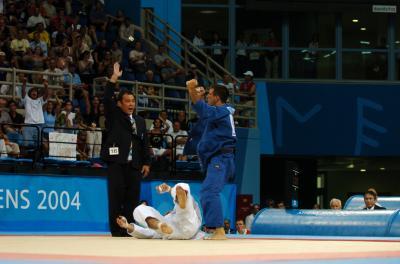Everyone has seen what athletes do after a victory - footballers may take their shirts off and slide on their knees, baseball hitters may pump their fists.
That instinctive reaction that occurs is a biological imperative to display dominance over opponents rather than a sense of personal satisfaction, according to a paper in Motivation and Emotion.
Psychologists have given this body language a name - "dominance threat display." We used to call that a simple triumphant gesture but San Francisco State University Professor of Psychology David Matsumoto and adjunct faculty member Hyisung Hwang observed winners of Olympic and Paralympic judo matches and believe those gestures are innate and stem from an evolutionary need to establish order and hierarchy in society.
In a paper published in November, they found that an athlete's culture affects the intensity with which he or she displays this body language and said that this triumph is different than pride, which they say requires more cognitive thinking and reflection.

This judo player is apparently not happy about the successful throw, he is driven by an evolutionary imperative to establish order and hierarchy in society. Credit: SF State
They wanted to know whether expressions of triumph are the immediate reaction of an athlete following victory so they looked at the first body motion made by an athlete upon learning he or she was victorious and determined whether that action was among those considered to constitute "triumph". Then they rated the intensity of the action on a five-point scale.
Actions considered triumphant included raising the arms above the shoulders, pushing the chest out, tilting the head back and smiling. They were observed in winning athletes from all cultural backgrounds and even in blind Paralympic athletes, which suggests to psychologists that it is biologically innate.
"It is a very quick, immediate, universal expression that is produced by many different people, in many cultures, immediately after winning their combat," Matsumoto said. "Many animals seem to have a dominant threat display that involves making their body look larger."
In their other study, Hwang and Matsumoto compared the intensity of an athlete's expressions of triumph with his or her culture's "power distance" (PD), a measurement that represents the degree to which a culture encourages or discourages power, status and hierarchical differences among groups. They found that athletes from cultures with high PD produced such body language more than those from cultures with low PD.

An Olympic judo player expresses his evolutionary imperative while the judge wishes he were from a country with a different power distance. Credit: SF State
Countries with high PD include Malaysia, Slovakia and Romania, while countries with low PD include Israel, Austria and Finland. The United States and United Kingdom fall in the middle of the PD spectrum, along with countries such as Hungary, Iran and Italy.
The results make sense, Matsumoto said, given the importance of displaying dominance to establishing status and hierarchy within a group so that the group operates efficiently. Countries that place a greater emphasis on hierarchy have a greater need for body language that helps establish power and status. But such actions can be seen in many different types of groups, he added.
"If you're in a meeting, the person sitting in the 'power chair' is going to be more erect and look taller, they're going to use a strong voice, they're going to use hand gestures that signify dominance," he said. "If there's conflict, the person who yells the most or is the most stern will be seen as the leader. It establishes the hierarchy in that context."
Additional research is needed to see if the results can be replicated across other contexts, Matsumoto said. He is also hoping to further study when these types of behaviors occur and what triggers them, as well as collect additional data to bolster the theory that triumph is a separate expression from pride.




Comments